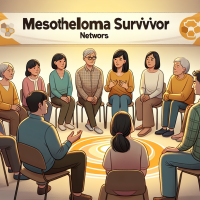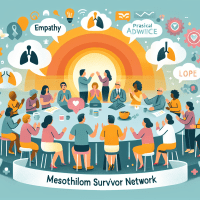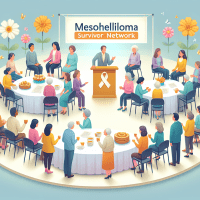Mesothelioma Survivor Network Events: A Beacon of Hope and Community
Hello, I’m a registered nurse with over 10 years of experience in oncology, specializing in patient education and support. Today, I want to share my heartfelt insights on mesothelioma survivor network events—a vital space where patients, families, and caregivers come together, share their journeys, and find solace. Whether you’re newly diagnosed or have been living with mesothelioma for some time, these events provide an opportunity to connect, learn, and most importantly, feel less alone.

Understanding Mesothelioma and the Need for Community
Mesothelioma is a rare, aggressive cancer with profound effects on every aspect of a person’s life. As someone who has been closely involved in patient care, I know how isolating this diagnosis can feel. The struggle to understand treatment options, manage side effects, and cope emotionally can be overwhelming. That’s why mesothelioma survivor network events, including support groups and awareness events, are so critical. These events facilitate shared experiences and empower attendees by providing both information and emotional comfort.
A vibrant gathering at a mesothelioma survivor event, reflecting hope and community support.
What to Expect at Mesothelioma Survivor Network Events
Each mesothelioma survivor network event is unique in its approach to foster togetherness and support. Here are some common themes you might encounter:
- Support Groups: Intimate sessions where individuals share personal experiences, challenges, and triumphs. These groups often become a sanctuary of empathy and mutual encouragement.
- Awareness and Fundraising Events: Opportunities to educate the public, raise funds for research, and bring visibility to mesothelioma through community involvement.
- Conferences and Symposiums: Expert-led sessions on the latest advances in mesothelioma treatment, staging, and diagnostic techniques, such as various biopsy methods including thoracoscopy and thoracentesis.
- Physical and Emotional Wellness Workshops: Sessions designed to address anxiety, fear, and grief—focusing on coping strategies, mindfulness, and the importance of mental health support.
Diagnosis, Staging, and Treatment: A Brief Overview
Understanding your diagnosis is the first step in managing mesothelioma. Typically, patients undergo biopsies like thoracoscopy or thoracentesis to confirm the diagnosis. The staging system for mesothelioma is divided into four stages:
- Stage 1: Localized disease with a higher chance of successful treatment.
- Stage 2: Cancer beginning to spread within the chest, making treatment more complex.
- Stage 3: Locally advanced disease where the cancer may have spread to nearby tissues.
- Stage 4: Advanced stage with metastasis, where the focus shifts towards palliative care and quality of life.
It’s crucial to discuss your options with your healthcare provider. Treatment modalities vary, encompassing surgery, chemotherapy, radiotherapy, and newer targeted therapies. I encourage you to use mesothelioma survivor network events as a forum to learn more about these options and to address your concerns with both peers and medical professionals.
Emotional and Practical Coping Strategies
Dealing with mesothelioma demands not only physical resilience but also emotional fortitude. I’ve witnessed firsthand the healing power of shared experiences and community support. Here are some strategies that I and many others have found invaluable:
- Participate in Support Groups: Whether face-to-face or online, connecting with others who understand your journey can reduce feelings of isolation.
- Practice Mindfulness and Stress Reduction: Simple techniques such as deep breathing, meditation, or even guided imagery can help manage anxiety and bring clarity.
- Engage with Medical and Emotional Resources: Organizations like the National Cancer Institute, American Cancer Society, and Mesothelioma Applied Research Foundation are excellent starting points for verified, compassionate advice.
- Open up to Loved Ones: Sharing your fears and hopes with family members or close friends can build a support network that extends well beyond clinical settings.
A Personal Reflection
From my heart to yours: there is strength in vulnerability. Attending survivor network events has helped me understand that while mesothelioma changes our lives, it does not define us. I have seen courage blossom in the midst of despair and hope rekindle with every new connection. You are not alone in this fight, and every shared story is a step towards healing.
Navigating the Road Ahead: Next Steps and Support Resources
As you consider attending a mesothelioma survivor network event, here are practical steps to help you take control of your journey:
- Research Local Events: Look for events near you by searching terms like “mesothelioma support groups” or “mesothelioma awareness events.” Many regions host events in tandem with broader initiatives, such as National Asbestos Awareness Week or the International Symposium on Malignant Mesothelioma.
- Consult with Your Healthcare Team: Discuss any potential event with your doctor to ensure it aligns with your current treatment plan and health needs.
- Connect Online: Social media groups and dedicated forums provide ongoing support. They can be especially helpful if you’re unable to attend in-person gatherings.
- Prepare Questions and Concerns: Write down any questions you might have regarding treatment options, symptom management, or available support resources. This can be a useful checklist when speaking with both healthcare professionals and fellow survivors.
Engaged participants at a mesothelioma awareness conference, united in resilience.
Additional Resources and Internal Links
For those seeking more detailed guidance, I suggest exploring these additional resources on our site:
- In-Depth Mesothelioma Treatment Options – Comprehensive details on current strategies and clinical trials.
- Emotional and Caregiver Support for Mesothelioma – A guide tailored for families and caregivers navigating the complexities of support.
Understanding Clinical Staging and Treatment Options
Further to the earlier discussion on diagnosis, here’s a simple table illustrating the common stages of mesothelioma and associated treatment approaches:
| Stage | Description | Treatment Approach |
|---|---|---|
| Stage 1 | Localized cancer | Surgery and localized therapies |
| Stage 2 | Slight spread | Combination of surgery, chemotherapy, and radiation |
| Stage 3 | Locally advanced disease | More aggressive, multimodal treatment |
| Stage 4 | Advanced, metastatic | Palliative care, symptom management |
Information on treatment guidelines is current as of May 2025 and is intended to provide an overview only. I always recommend discussing your unique circumstances with your medical team.
From My Heart to Yours: Final Thoughts and Encouragement
As I reflect on the journey many of us face, I am continually inspired by the courage and resilience seen at every survivor network event. My hope is that the insights shared here instill not just knowledge but also the warmth of community support. The path through mesothelioma is challenging, but remember that every step you take is backed by years of shared experience and expertise in the oncology field.
I want to emphasize that while I share my experiences and insights from years of service, this information is not a substitute for professional medical advice. Please consult with your health care provider for personalized guidance. Additionally, my blog is supported by community contributions and ethical partnerships that help keep this resource free and accessible to everyone who needs it. This transparency helps ensure you receive comprehensive support without any hidden agendas.
If you ever feel overwhelmed, consider reaching out to a local support group or trusted loved one. Together, we can find the strength to navigate even the toughest times. Remember, each event, each conversation, and each shared story is a step towards healing and empowerment.
Thank you for allowing me to walk alongside you on this journey. I invite you to keep exploring, learning, and connecting with others who understand your battle with mesothelioma. May you find the comfort, understanding, and strength you need to move forward.
Information on mesothelioma diagnosis, staging, and treatment is provided for educational purposes. For personalized advice, please consult a healthcare professional.






